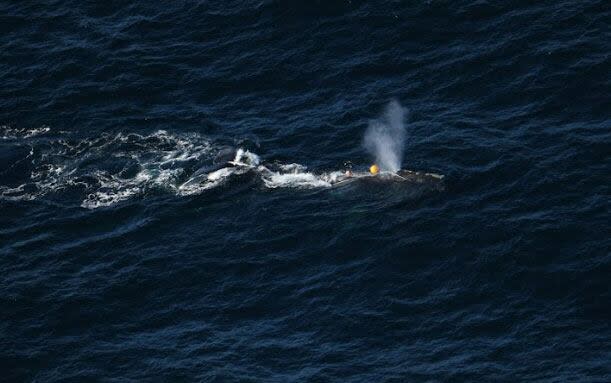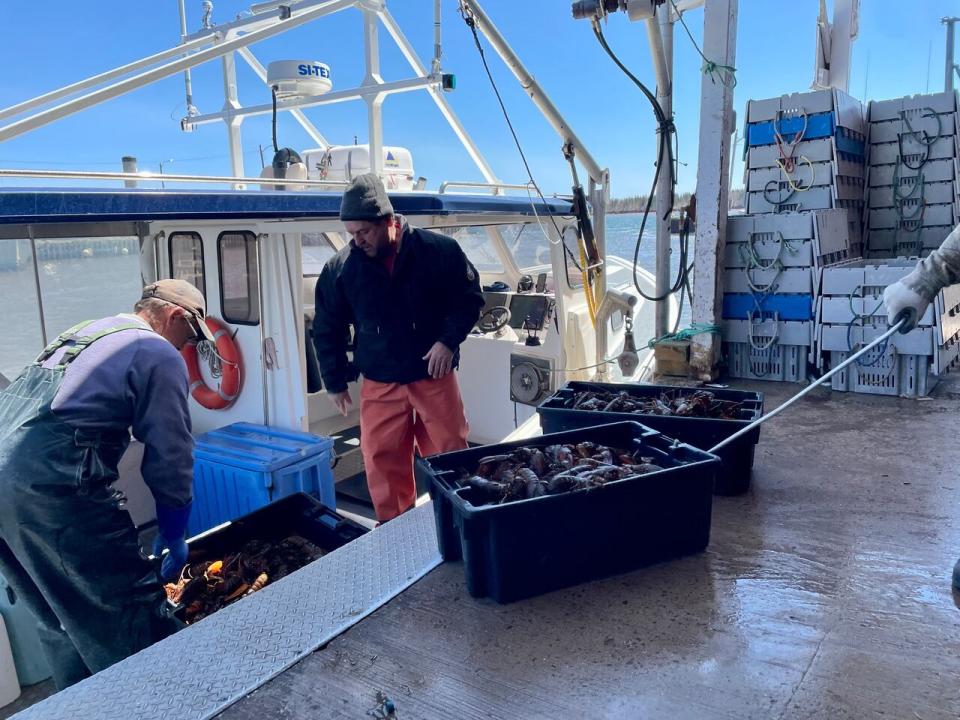Season's 1st North Atlantic right whale sighting is bracing P.E.I. fishers for the next one

The 2023 lobster fishing season was just three weeks old when two endangered right whales were spotted to the east of Western P.E.I.
For the first time ever, the Department of Fisheries and Oceans shut that section of Lobster Fishing Area 24, meaning lobster crews had to move their traps to shallower waters until the whales left, rather than risk them becoming entangled in fishing gear.
Nearly one year later, a marine biologist says P.E.I. fishers are reflecting on the lessons they learned, after an entangled right whale was spotted on Friday northeast of New Brunswick, prompting fishing closures in the Gulf of St. Lawrence.
"The closure comes right almost to the tip of LFA 24 on the northwest end of Prince Edward Island," said Melanie Giffin from the P.E.I. Fishermen's Association. "So it doesn't affect LFA 24, but it would only take the whale moving a small distance to shift that closure a little bit."
She said the impact of last year's closure on P.E.I. boats was "pretty big," though it lasted just 15 days, since they had never been in the situation before.
"There was a lot of moving gear, a lot of condensed gear into a small area, and a lot of questions came up around how we do the protocol," said Giffin. "It really triggered a lot of new questions since it was the first time we had experienced it here on the Island."

'Fishers are really becoming more accustomed to fishing with North Atlantic right whales in the area,' says Melanie Giffin, a marine biologist for the P.E.I. Fishermen's Association. (Tony Davis/CBC)
There have been a few changes since last year, she said. For starters, the 2023 closure was to the 10-fathom line, leaving some fishers in shallower water than the rest.
"One thing that the fishers in the area asked for was to have a meeting with DFO and potentially extend that line just a little bit," said Giffin. "DFO obliged them on that."
It was a big learning experience. — Melanie Giffin, P.E.I. Fishermen's Association
In addition, she said DFO typically gives fishers a 48-hour window to get their gear from the water. But that theoretically meant boats could haul in their gear, remove any lobster, reset it to catch more, and then remove it again during that window.
A new rule is in place to prevent that. Once the gear is out, it must be moved outside the area that closed.
"That's no longer allowed," said Giffin. "It just reduces the risk to the whales."

Last year, fishers like David Henderson, right, had to move 120 traps into shallower water to protect right whales spotted in the area on May 18, 2023. (Steve Bruce/CBC)
Finally, she said DFO has committed to communicating better with the association so that it can share any information it gets with the fishing crews.
"It was a big learning experience, just making sure they know where to check and who to talk to about what's closed; if it's going to extend, if it's going to reopen — all of those things come into play at that point."
While people wait to see what happens with the whale recently spotted in the Gulf of St. Lawrence, Giffin said she hasn't received many questions from P.E.I. fishers yet.
But she does know they are keeping a close eye on its whereabouts.
"Fishers are paying closer attention to the whale insight map and notices that come out from DFO to ensure that they are not interacting with the whale in any way," she said.


